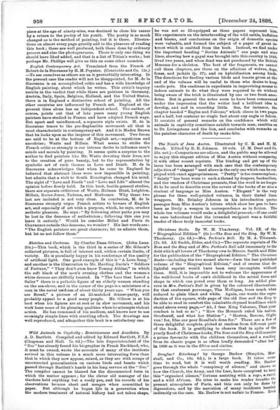Wad Animals in Cavtitrity : Reminiscences and Anecdotes. By A.
D. Bartlett. Compiled and edited by Edward Bartlett, F.Z.S. (Chapman and Hall. 7s. 6d.)—The late Superintendent of the "Zoo" has already found his biographer in Frank Buckland, who, it must be owned, wrote the accounts of many of the incidents revived in this volume in a much more interesting form than that in which they now appear, mixed, as they are with scraps of unconnected generalisation on various birds and beasts which passed through Bartlett's hands in his long service at the "Zoo." The compiler cannot be blamed for the disconnected form in which the matter appears ; for the clever old manager of the Gardens held anything but a ready pen, and his records of his observations became short and meagre when committed to paper. But although he began life in a generation when the modern treatment of natural history had not taken shape, he was not BO ill-equipped as these papers represent him. His experiments on the interbreeding of the wild cattle, buffaloes and bisons, and conclusions on the origin of domestic species were valuable, and formed the subject of a paper of great in- terest which is omitted from the book. Instead, we find under the important heading "Bovine Animals" one page and sate lines, showing how a gayal was brought into this country in 184.i, lived two years, and when dead was not purchased by the British Museum for a skeleton. The best of the fragments, we cannot call them chapters, are those on the affinities of wolves, dogs, foxes, and jackals (p. 37), and on hybridisation among birds. The directions for feeding various birds and beasts given at the end of the volume will be useful to those who desire to keep exotic pets. His readiness in expedients in improvising means to induce animals to do what they were required to do without being aware of the trick is illustrated by one or two fresh anec. dotes. But in general the notes seem to have been commenced under the impression that the writer had a brilliant idea to develop, and end in recording little. See, for instance, the chapter headed "Eagles and Falcons," which closes in two pages and a half, but contains no single fact about any eagle or falcon. It consists of general remarks on the confidence which wild animals in captivity sometimes exhibit towards man, rambles on to Dr. Livingstone and the lion, and concludes with remarks on the painless character of death by snake-bite.






































 Previous page
Previous page